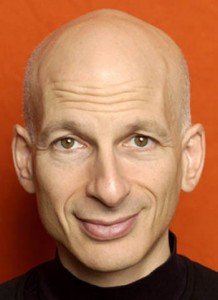I’ve begun several days of immersion in the work of Internet marketing thinker Seth Godin, as I prepare to interview him on Wednesday for the Reading Edge podcast.
Last night I took notes while watching his presentation a year ago at the O’Reilly Media Tools of Change conference. He took the audience, largely drawn from the ranks of worried publishers, on a book-by-book tour of what he had learned to that point in the publishing of his own 10 books. Each represented a separate experiment, from free samples to packaging a book as a milk carton.
That relentless experimentation is what impresses me so far in my Seth Godin Immersion Project. He is finding the way forward by daring to try anything, by courageously following his own curiosity. He appears to have a high tolerance for his own mistakes, as when he chose this title for a book he hoped marketers would purchase: All Marketers are Liars. At TOC, he ruefully noted that if the title had been All Marketers are Great Lovers he probably would have sold a lot more copies.
I will confess that I have been arguing with some of Godin’s latest book, Linchpin: Are You Indispensable? As I’ve read it on my Kindle, I’ve irritably typed notes questioning his stereotyped view of corporations, whom he portrays as uniformly seeking cogs as employees, not original thinkers and creative team members. “The goal is to hire as many cheap but talented people as possible, give them a rule book, and have them follow instructions to the letter” he writes at one point. I wonder what planet Seth was inhabiting in the 1990s during the employee participation movement inspired by the work of W. Edwards Deming. At that time, I was an exec at a regulated gas utility company in Casper, Wyoming–not exactly a hotbed of the latest in management thinking. But I can assure you that any member of management who espoused the strategies Godin mocks in Linchpin would have been out on the prairie faster than you can say “does not get it.”
I also take issue of WITH his portrayal of artists, which he posits as a model for linchpins. He writes, “…all artists have this optimism, because artists can honestly say that they are working to make things better.” His artists are happy, optimistic super-creatives who can market tofu just as easily as write War and Peace. A simple place to begin questioning that one would be the number of artists whose lives became so desperate they ended them by their own hands.
But though I have my quibbles with Linchpin, I have already been changed by this book. I am asking myself how I can become a linchpin. By that, I’m taking his point that the more human, remarkable, and fast on my feet I can become as a podcaster covering the eBook Revolution, the more I will connect with listeners and readers, which is how I can become indispensable. This will, in fact, be the second time Seth Godin has changed my life. When I read The Dip, I decided to abandon two weekly podcasts I’d been using to lean tricks of the trade, because by then it was clear that my best opportunity lay in the Kindle Chronicles.
Seth Godin wants to spread ideas that change people. In pursuit of that goal, he is selling a ton of books and getting invited to all the best places to give speeches, like TED. But beyond curiosity and innovation, I suggest that his real secret sauce is credibility. When I watch him prowl the stage like a casual leopard, sharing his ideas and questions, I believe he’s mainly telling the truth as he perceives it in that moment. If he can write a book teaching us how to do that, he won’t need to make it look like a milk carton.
Darlene and I have spent a couple of days here at Ocean Park, Maine, before our return to Denver tomorrow. The openness and austere beauty of a summer colony in winter makes this a wonderful place for taking in new ideas. Seth Godin has been good company. I look forward to my conversation with him three days from now.


